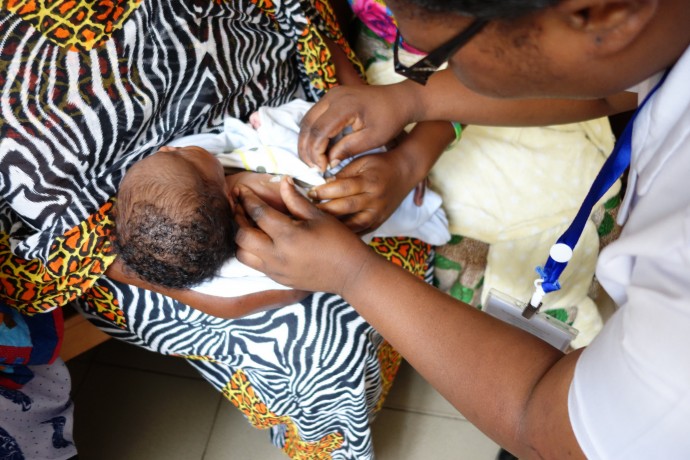Unique Identifiers for Routine Immunizations
By Mali Kambandu, Communications Officer, BID Initiative
Dec 16, 2015
Posted in BID Learning Network (BLN), Policies & Practices, Products

A baby is vaccinated against tuberculosis. Photo: PATH.
A baby is born. Immediately, that baby’s identity is linked to his or her mother. When the baby goes to the health facility for the first of its vaccinations, the mother’s name and identification papers are critical. Almost every service the baby receives at the health center is connected to the mother because he or she did not receive an official, unique form of identification when born.
“This is a global problem. It is one of the most common topics in many of the countries where we work,” said Kate Wilson, PATH’s Director of Digital Health Solutions at this week’s BID Learning Network (BLN) Discussion Meeting in Arusha, Tanzania. Kate makes this statement because it is a challenge the BID Initiative is trying to solve, and as BLN countries came together, it is a topic that was widely discussed.
“The government has to agree on what identification (ID) the patient should provide,” notes Dominic Atweam, Health Information System Analyst with the Ghana Health Service. Many of his colleagues agree—national governments must drive the method to register and identify new babies receiving health services, such as immunizations.
To enter the national health system and receive routine immunizations and other treatments, a person needs to have a unique identifier so their patient history can be tracked, and so they can receive continuity of care if they move or go to a different facility in another region of the country. However, in many countries, national identity documents are only available at sixteen or eighteen years of age. This means that before eighteen years, there is difficulty linking patient records; the child’s information could easily be lost or compromised. This challenge affects countries working within the BID Initiative, either as demonstration, design, or discussion countries and must be resolved as health workers make critical decisions with the immunization data collected for each child in each country. With tenuous identification methods, the data management systems may not work as effectively as required, and children may not receive all of their vaccines. Therefore, the quality of health service delivery cannot improve.

Nurses scan infants health cards to verify which vaccinations are required at the Ngarenaro Health Center in Arusha, Tanzania. Photo: Bill & Melinda Gates Foundation.
In Zimbabwe, each child born is registered with a unique national identification number, which they will use as their official ID until they turn eighteen. This ensures that a health worker attending to a child at the health facility can track their care history and see which immunizations the child has missed. More importantly, this ID has the potential to track the child in their communities and enable health workers to follow up if they have missed vaccination appointments. Such solutions were discussed at the BLN Discussion Meeting, a useful forum for countries to collaborate and share solutions to common problems.
Perhaps, as these solutions are brought forward, national governments can begin working to solve this common problem and achieve a common standard in health service delivery for children.
